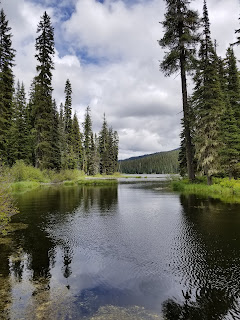Why should you care about the environment?
We (humans and wildlife) all live on the same planet and
share natural resources. We all breathe the same air, drink the same water, and
eat food grown in shared soils. Essentially, we are all connected to each other
and dependent on the same resources. Therefore, we should all consider the Earth
and its environment our home. We should feel connected to the resources we use
and depend on instead of disconnected like the majority of us feel. If we begin
to view the environment as our home, we may be more incline to keep it clean
and thriving. Often we feel disconnected from the environment around us. We buy
food from the store instead of working the land ourselves. We turn on the tap
for clean water taking for granted that 783 million people worldwide do not
have access to clean and safe water (Water Project, 2016). A more sobering fact
is that in 2014 1.6 million Americans reported not having access to running
water, a toilet or a tub/shower (Riggs, 2018). Let us not take for granted our
access to clean and safe running water. You can do your part to keep our watersheds
clear of pollution and conserve water to ensure that future generations have
access to clean water.
We all need clean air to breathe and as such should do our
part to keep the atmosphere healthy. Whether you believe in human caused
climate change or not the facts are our plant is getting hotter. This is not a discussion
of the legitimacy of the climate change yet a call of action to reduce your carbon
footprint. Each of us can take steps to reduce the amount of carbon we put
into the air. Simple things like using reusable
containers instead of disposable ones and reducing the number of trips we take
to the store each week. Traveling by motor vehicle and airplane is a major
contributor to greenhouse gas emissions. Although it is impossible to stop
travel, we can learn how to reduce
waste while traveling. Additionally, if you must fly, you can purchase carbon
offsets that help fund positive conservation projects. Another major contributor
to greenhouse gas emissions is excessive energy use. You can save energy, save
money, and improve air quality by weatherizing
your home.
Soil resources
are the easiest natural resources to forget about and one that most people do have
not a connection to at all or so they think. We are all heavily dependent on
our soil resources. The food we eat doesn’t come from a store, it comes from a
farm where it was grown in soil. We can do our part to help improve soil
quality by not wasting
food. By wasting food, we cause unnecessary stress on the food production
industry. And as such, farmers are pressured to increase production. This
increased production comes with a cost – excessive fertilization and water
consumption both of which are bad for the environment.
We are all in this together and as such should do our part
to keep the environment healthy not only for us but also for the wildlife. If we
do not take care of our home, its natural resources and natural beauty then who
will? It is our responsibility as stewards of the land (and wildlife) to ensure that
future generations have the same opportunity to have clean air, water, and
soil. Not to mention, natural places to visit and view wildlife. Please, consider
your actions and how they affect the world in which you live.
Lastly, consider the actions of our government. We do not
want to return to the days of burning rivers like the Cuyahoga River in Ohio
that was so polluted with chemicals it caught fire in 1969 (OHC, n.d.). Take
the time to write your congressional
representative and express to them your care and concern for a clean
environment.
I’ll leave you with a quote from John Muir, “When one tugs
at a single thing in nature, he finds it attached to the rest of the world”.
Resources:
Ohio History Central. (n.d.) Cuyahoga River fire. Retrieved
from http://www.ohiohistorycentral.org/w/Cuyahoga_River_Fire
Riggs, E. (2018). Clean water access challenges in the
United States. UNC Chapel Hill. Retrieved from http://efc.web.unc.edu/2018/02/13/clean-water-access-challenges-in-the-united-states/
Water Project. (2016). Facts about water: Statistics of the
water crisis. Retrieved from https://thewaterproject.org/water-scarcity/water_stats




Comments
Post a Comment